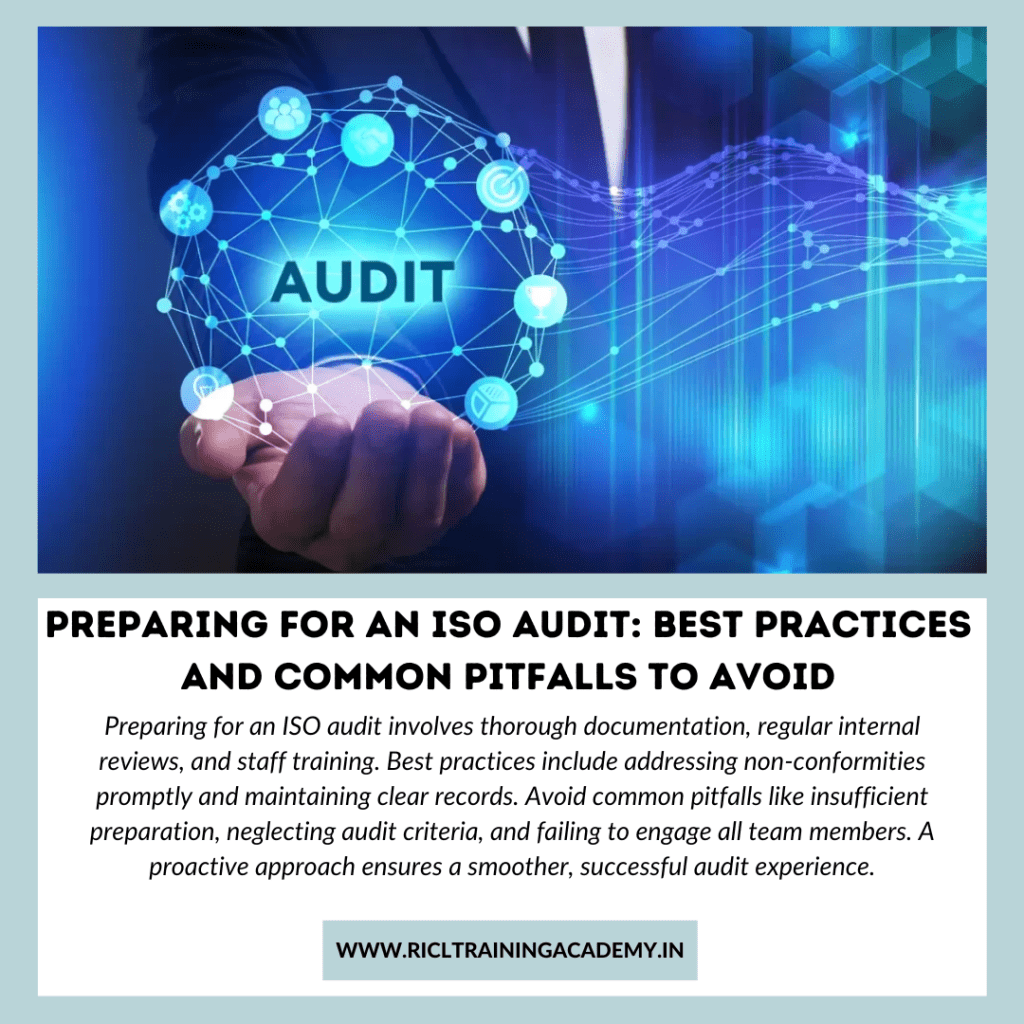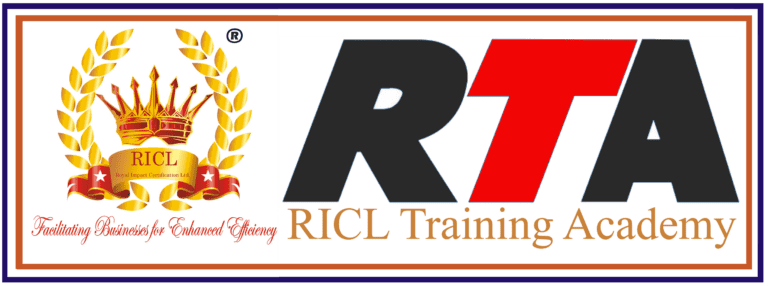ISO Audit Best Practices to ensure compliance, improve processes, and enhance organizational efficiency while meeting global standards.
Preparing for an ISO Audit Best Practices & Common Pitfalls to avoid
ISO audit with essential best practices and avoid common pitfalls. Enhance your audit readiness and ensure a successful ISO certification process. Preparing for an ISO audit can be a complex and demanding process, but it is crucial for ensuring that your organization meets international standards and maintains compliance

Preparing for an ISO audit can be a complex and demanding process, but it is crucial for ensuring that your organization meets international standards and maintains compliance. Proper preparation not only helps in passing the audit but also enhances your organization’s processes and systems. This comprehensive guide outlines best practices for preparing for an ISO audit and highlights common pitfalls to avoid, ensuring a smooth and successful audit process.
Understanding the ISO Audit Process
An ISO audit assesses an organization’s compliance with ISO standards, such as ISO 9001 (Quality Management Systems), ISO 14001 (Environmental Management Systems), or ISO 45001 (Occupational Health and Safety). The audit typically involves a thorough review of your organization’s processes, documentation, and practices to ensure they meet the requirements of the relevant ISO standard.
The audit process generally includes:
- Pre-Audit Preparation: Involves understanding the audit scope, preparing documentation, and training staff.
- Audit Execution: The actual audit where auditors assess compliance through interviews, observations, and document reviews.
- Post-Audit Activities: Addressing any non-conformities identified and implementing corrective actions.
Best Practices for Preparing for an ISO Audit
- Understand the ISO Standard
Before the audit, ensure that you have a thorough understanding of the ISO standard being audited. Familiarize yourself with the requirements and how they apply to your organization. This knowledge helps in aligning your processes with the standard’s criteria.
Action Steps:
- Review the latest version of the ISO standard.
- Ensure that relevant staff members are also knowledgeable about the standard.
- Conduct a Pre-Audit Assessment
A pre-audit assessment or internal audit is crucial for identifying potential issues before the official audit. This assessment helps in evaluating your organization’s compliance and addressing gaps in your processes.
Action Steps:
- Schedule and conduct an internal audit.
- Use the results to implement corrective actions and improvements.
- Prepare Documentation
ISO audits require comprehensive documentation, including policies, procedures, records, and reports. Ensure that all required documents are up-to-date, accurate, and readily accessible.
Action Steps:
- Review and update your documentation.
- Organize documents in a systematic manner for easy retrieval during the audit.
- Train Your Staff
Properly trained staff are essential for a smooth audit. Ensure that all employees understand their roles and responsibilities related to the ISO standard and are prepared to answer questions from auditors.
Action Steps:
- Conduct training sessions on ISO requirements and audit procedures.
- Inform staff about the audit schedule and their roles during the audit.
- Implement Corrective Actions
Address any issues or non-conformities identified during the pre-audit assessment or internal audits. Implement corrective actions and ensure that improvements are effectively communicated and integrated into your processes.
Action Steps:
- Document and track corrective actions.
- Monitor the effectiveness of implemented solutions.
- Review and Test Processes
Review and test your processes to ensure they operate effectively and comply with the ISO standard. This includes verifying that processes are followed as documented and identifying any areas for improvement.
Action Steps:
- Conduct process reviews and tests.
- Ensure that processes align with ISO requirements and address any discrepancies.
- Prepare for Auditor Questions
Anticipate questions that auditors might ask and prepare your responses. This includes understanding how your processes meet ISO requirements and being ready to provide evidence and examples.
Action Steps:
- Develop a list of potential auditor questions.
- Prepare clear and concise responses with supporting evidence.
- Ensure a Smooth Audit Environment
Create a conducive environment for the audit by ensuring that all relevant staff and documents are available and that there are no disruptions. A well-organized environment reflects positively on your organization’s readiness.
Action Steps:
- Prepare the audit area and ensure it is free from interruptions.
- Ensure that key personnel are available and prepared for interviews.
Common Pitfalls to Avoid
- Incomplete Documentation
One of the most common pitfalls is having incomplete or outdated documentation. This can lead to confusion during the audit and may result in non-conformities.
Avoidance Strategies:
- Regularly review and update documentation.
- Ensure that all required documents are complete and accurate.
- Lack of Staff Training
Staff who are not properly trained on ISO requirements or audit procedures can create challenges during the audit. This can lead to incorrect responses or misunderstandings with auditors.
Avoidance Strategies:
- Provide comprehensive training to all relevant staff.
- Conduct refresher courses as needed.
- Ignoring Internal Audit Results
Failing to address issues identified during internal audits can lead to repeated non-conformities during the external audit. It is essential to act on internal audit findings and implement corrective actions promptly.
Avoidance Strategies:
- Act on internal audit findings and track corrective actions.
- Regularly review the status of corrective actions.
- Poor Preparation of Evidence
Auditors require evidence to verify compliance. Failing to provide organized and clear evidence can hinder the audit process and affect the audit outcome.
Avoidance Strategies:
- Organize evidence and documentation systematically.
- Ensure that evidence is easily accessible and relevant to the audit.
- Inadequate Communication
Lack of communication between teams can lead to inconsistencies and misunderstandings during the audit. Effective communication is essential for ensuring that everyone is on the same page.
Avoidance Strategies:
- Establish clear communication channels.
- Ensure that all team members are informed about audit procedures and expectations.
- Overlooking Non-Conformities
Ignoring minor non-conformities or assuming they will not be noticed can be detrimental. Auditors are trained to identify even small issues, which can lead to larger problems.
Avoidance Strategies:
- Address and rectify minor non-conformities promptly.
- Maintain a proactive approach to resolving issues.
- Failure to Follow Up
After the audit, failing to address any non-conformities or recommendations can undermine the benefits of the audit and lead to repeated issues in future audits.
Avoidance Strategies:
- Develop a corrective action plan for any non-conformities.
- Monitor and review the effectiveness of corrective actions.
Conclusion
Preparing for an ISO audit requires careful planning, thorough documentation, and effective communication. By following best practices such as understanding the ISO standard, conducting pre-audit assessments, preparing documentation, and training staff, you can ensure a smoother audit process. Avoiding common pitfalls like incomplete documentation, lack of staff training, and inadequate communication is equally important for achieving a successful audit outcome.
With proper preparation and awareness of potential challenges, you can navigate the audit process confidently and maintain compliance with ISO standards, ultimately driving continuous improvement within your organization.
Lead Auditor & Internal Auditor Training: QMS, EMS, OHSMS + Awareness Courses
Refine your know-how in Quality Management Systems by taking our all-inclusive Lead Auditor QMS training course. We equip you with skills necessary for effective auditing as well as ensuring conformance with ISO standards. It is an excellent resource for people who want to become professionals in QMS auditing through detailed knowledge and practical information.”
Become a certified Lead Auditor in Environmental Management Systems with our specialized training course. This program offers necessary know-how and skills for conducting effective inspections while also promoting environmental compliance according to ISO regulations. The perfect opportunity for those looking to progress their career further into the realm of environmental management”
Pursue your career growth using our Lead Auditor OHSMS training course, which is tailored towards equipping you with the skills needed to undertake comprehensive evaluations of Occupational Health and Safety Management Systems. Obtain practical capabilities as well as experience that guarantee individual workplaces’ security conformity with the most recent ISO requirements”.
Our Internal Auditor QMS training can help you improve your auditing skills. This course covers the principles and practices necessary for conducting internal audits of Quality Management Systems. Ideal for professionals looking to increase their understanding of QMS and contribute to organizational excellence.
Our Internal Auditor EMS course will help you enhance your skills in environmental auditing. Learn techniques and standards needed to implement efficient internal audits of environmental management systems, ensuring ISO compliance and its environmental sustainability.
The purpose of our Internal Auditor OHSMS training is to equip you with the necessary skills to conduct effective internal audits. This course gives an extensive overview on how to audit Occupational Health & Safety Management Systems so that you can achieve compliance and create a safe workplace.
Hone your understanding of Quality Management Systems (QMS) through our Awareness Auditor QMS. These courses provide a basic understanding of the principles, benefits and implementation strategies of QMS making them instrumental for improving quality management practices by individuals or teams.
Familiarize yourself with essential knowledge regarding the Environmental Management Systems by exploring our Awareness Auditor EMS. The courses offer an overview of the principles of EMS which will help you comprehend environmental policies and procedures along with their importance in achieving sustainability targets.
Out training programs on Occupational Health and Safety Management Systems are meant to improve your awareness in this field. This course is intended for organizations and individuals, they provide essential information on OHSMS principles and practices that lead to safer and compliant work environments.
Other Blogs
- Adaptability Thrive in a Dynamic World
- Artistic Sense Elevate Expression & Drive Innovation
- Body Language A Key Form of Non-Verbal Communication
- Business Ethics: Upholding Integrity and Sustainability
- Business Etiquette Cultivating Professionalism and Success
- Business Trend Awareness Stay Ahead & Drive Success
- Collaboration Foster Synergy for Collective Success
- Competitiveness Driving Excellence & Superior Performance
- Conflict Resolution Navigate Tensions for Positive Results
- Crisis Management Strategic Response & Communication
- Critical Thinking Empower Strategic Decisions
- Customer Service Excellence: Fostering Relationships and Driving Success
- Customizing ISO Training for Different Industry Needs: A Tailored Approach
- Dealing with Difficult People Constructive Interaction Tips
- Decision Making: Strategies for Complex Environments
- Delegation Strategic Empowerment for Success
- Design Sense Inspire Creativity & Spark Innovation
- Diplomacy Navigate Relationships & Achieve Goals
- Disability Awareness Embracing Inclusion and Empowerment
- Dispute Resolution Foster Collaboration & Harmony
- Diversity Awareness Fostering Inclusion and Collaboration
- Empathy Enhance Understanding & Build Stronger Connections
- Entrepreneurial Thinking Cultivating Innovation and Initiative
- Facilitation Enhance Group Dynamics Effectively
- Feeling Stagnant in Your Career? Start Here
- Giving Feedback Bridging Performance Gaps Effectively
- Humor A Universal Aspect of Human Experience
- Inspiring Cultivate Authentic Leadership
- Interviewing Skills Effective Communication in Recruitment
- ISO 14001 Lead Auditor Courses PDF Download
- ISO 14001 Lead Auditor Courses Study Material
- ISO 14001: Environmental Management Training Essentials
- ISO 22301 Internal Auditor Courses Material Download
- ISO 22301 Lead Auditor Courses Fees
- ISO 22301 Lead Auditor Courses Material Download
- ISO 22301 Lead Auditor Courses PDF Download
- ISO 30000 Internal Auditor Courses Material Download
- ISO 37001 Lead Auditor Courses PDF Download
- ISO 37001 Lead Auditor Courses Study Material
- ISO 41001 Internal Auditor Courses Material Download
- ISO 41001 Lead Auditor Courses Material Download
- ISO 41001 Lead Auditor Courses PDF Download
- ISO 41001 Lead Auditor Courses Study Material
- ISO 45001 Internal Auditor Courses Material Download
- ISO 45001 Lead Auditor Courses Fees
- ISO 45001 Lead Auditor Courses Material Download
- ISO 45001 Lead Auditor Courses PDF Download
- ISO 45001 Lead Auditor Courses Study Material
- ISO 50001 Internal Auditor Courses Material Download
- ISO 50001 Lead Auditor Courses Fees
- ISO 50001 Lead Auditor Courses Material Download
- ISO 50001 Lead Auditor Courses PDF Download
- ISO 50001 Lead Auditor Courses Study Material
- ISO 50001 Energy Management Training for Sustainability
- ISO 9001 Certification A Comprehensive Training Guide
- ISO 9001 Internal Auditor Courses Material Download
- ISO 9001 Lead Auditor Certificate Course
- ISO 9001 Lead Auditor Certification in India
- ISO 9001 Lead Auditor Courses Benefits
- ISO 9001 Lead Auditor Courses Cost
- ISO 9001 Lead Auditor Courses Exam Question and Answers
- ISO 9001 Lead Auditor Courses Fees
- ISO 9001 Lead Auditor Courses Fees
- ISO 9001 Lead Auditor Courses Fees in Chennai,Noida,Delhi
- ISO 9001 Lead Auditor Courses PDF Download
- ISO 9001 Lead Auditor Courses Study Material
- ISO Certification in Delhi NCR
- ISO Certification in India
- ISO Certification in Noida
- ISO Full Form
- ISO Lead Auditor Training Near Noida
- ISO Training for New Employees: Onboarding and Integration Best Practices
- Latest ISO Training Courses & Certificates
- Lead Auditor Certification
- Lead Auditor Course
- Lead Auditor ISO 14001 Course
- Lead Auditor ISO 22000 Course
- Lead Auditor ISO 45001 Course
- Lead Auditor ISO 9001 Course
- Lead Auditor Online Courses
- Lead Auditor Salary
- Lead Auditor Training
- Lead Auditor Training Provider in Delhi
- Lead Auditor Training Provider in India
- Lead Auditor Training Provider in Noida
- Listening The Cornerstone of Effective Communication
- Adaptability Thrive in a Dynamic World
- Artistic Sense Elevate Expression & Drive Innovation
- Body Language A Key Form of Non-Verbal Communication
- Business Ethics: Upholding Integrity and Sustainability
- Business Etiquette Cultivating Professionalism and Success
- Business Trend Awareness Stay Ahead & Drive Success
- Collaboration Foster Synergy for Collective Success
- Competitiveness Driving Excellence & Superior Performance
- Conflict Resolution Navigate Tensions for Positive Results
- Crisis Management Strategic Response & Communication
- Critical Thinking Empower Strategic Decisions
- Customer Service Excellence: Fostering Relationships and Driving Success
- Customizing ISO Training for Different Industry Needs: A Tailored Approach
- Dealing with Difficult People Constructive Interaction Tips
- Decision Making: Strategies for Complex Environments
- Delegation Strategic Empowerment for Success
- Design Sense Inspire Creativity & Spark Innovation
- Diplomacy Navigate Relationships & Achieve Goals
- Disability Awareness Embracing Inclusion and Empowerment
- Dispute Resolution Foster Collaboration & Harmony
- Diversity Awareness Fostering Inclusion and Collaboration
- Empathy Enhance Understanding & Build Stronger Connections
- Entrepreneurial Thinking Cultivating Innovation and Initiative
- Facilitation Enhance Group Dynamics Effectively
- Feeling Stagnant in Your Career? Start Here
- Giving Feedback Bridging Performance Gaps Effectively
- Humor A Universal Aspect of Human Experience
- Inspiring Cultivate Authentic Leadership
- Interviewing Skills Effective Communication in Recruitment
- ISO 14001 Lead Auditor Courses PDF Download
- ISO 14001 Lead Auditor Courses Study Material
- ISO 14001: Environmental Management Training Essentials
- ISO 22301 Internal Auditor Courses Material Download
- ISO 22301 Lead Auditor Courses Fees
- ISO 22301 Lead Auditor Courses Material Download
- ISO 22301 Lead Auditor Courses PDF Download
- ISO 30000 Internal Auditor Courses Material Download
- ISO 37001 Lead Auditor Courses PDF Download
- ISO 37001 Lead Auditor Courses Study Material
- ISO 41001 Internal Auditor Courses Material Download
- ISO 41001 Lead Auditor Courses Material Download
- ISO 41001 Lead Auditor Courses PDF Download
- ISO 41001 Lead Auditor Courses Study Material
- ISO 45001 Internal Auditor Courses Material Download
- ISO 45001 Lead Auditor Courses Fees
- ISO 45001 Lead Auditor Courses Material Download
- ISO 45001 Lead Auditor Courses PDF Download
- ISO 45001 Lead Auditor Courses Study Material
- ISO 50001 Internal Auditor Courses Material Download
- ISO 50001 Lead Auditor Courses Fees
- ISO 50001 Lead Auditor Courses Material Download
- ISO 50001 Lead Auditor Courses PDF Download
- ISO 50001 Lead Auditor Courses Study Material
- ISO 50001 Energy Management Training for Sustainability
- ISO 9001 Certification A Comprehensive Training Guide
- ISO 9001 Internal Auditor Courses Material Download
- ISO 9001 Lead Auditor Certificate Course
- ISO 9001 Lead Auditor Certification in India
- ISO 9001 Lead Auditor Courses Benefits
- ISO 9001 Lead Auditor Courses Cost
- ISO 9001 Lead Auditor Courses Exam Question and Answers
- ISO 9001 Lead Auditor Courses Fees
- ISO 9001 Lead Auditor Courses Fees
- ISO 9001 Lead Auditor Courses Fees in Chennai,Noida,Delhi
- ISO 9001 Lead Auditor Courses PDF Download
- ISO 9001 Lead Auditor Courses Study Material
- ISO Certification in Delhi NCR
- ISO Certification in India
- ISO Certification in Noida
- ISO Full Form
- ISO Lead Auditor Training Near Noida
- ISO Training for New Employees: Onboarding and Integration Best Practices
- Latest ISO Training Courses & Certificates
- Lead Auditor Certification
- Lead Auditor Course
- Lead Auditor ISO 14001 Course
- Lead Auditor ISO 22000 Course
- Lead Auditor ISO 45001 Course
- Lead Auditor ISO 9001 Course
- Lead Auditor Online Courses
- Lead Auditor Salary
- Lead Auditor Training
- Lead Auditor Training Provider in Delhi
- Lead Auditor Training Provider in India
- Lead Auditor Training Provider in Noida
- Listening The Cornerstone of Effective Communication

TESTIMONIALS
What Our Cutomers are Saying About us

Ruis aute irure dolor in reprehender voluptate velit esse cillum dolore fugiat pariatur sint occaecat cupidata non proie sunt in culpa aui officede









Reach us at:
info@ricltrainingacademy.in
support@ricltrainingacademy.in
sales@ricltrainingacademy.in
complaint@ricltrainingacademy.in
Call us at:
9355650992
9355650993
Visit us at:
Royal Impact Certification Limited
623 Tower -B, The Ithum Sector – 62, Noida, 201301.
Copyright © 2024 RICL Training Academy Team


